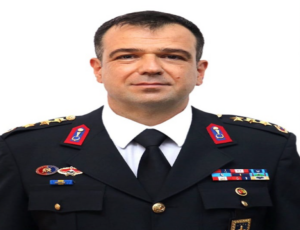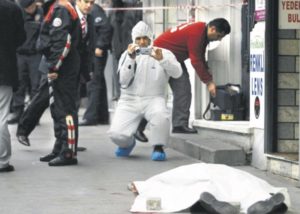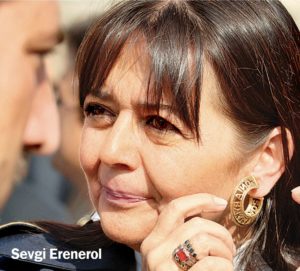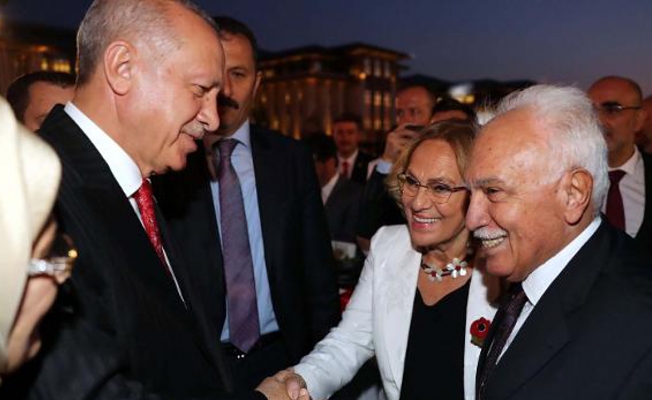Abdullah Bozkurt/Stockholm
A review of secret communications among members of the neo-nationalist Ulusalcı group, allied with the government of Turkish President Recep Tayyip Erdoğan, reveals a mindset that is xenophobic, antisemitic, autocratic and anti-Western as well one that advocates assassinations.
Members of the group, also called the Eurasianists (Avrasyacı), who favor the Russia/China/Iran axis, have long been embedded in Turkey’s media, politics and state security institutions. They survived criminal prosecutions between 2008 and 2014 and still wield considerable influence on Turkey’s domestic and foreign policy, thanks to their alignment with Erdoğan during the last decade.
The communications obtained by Nordic Monitor were between Ümit Sayın, an academic and ideologue for the neo-nationalists, and Lt .Col. Zafer Yener, then a first lieutenant working in military intelligence. The two were talking on an MSN chat program in 2005, sharing their thoughts and discussing strategies on how to drive the neo-nationalist agenda in Turkey through plots, murders and influence operations.
The communications were seized from the computer of Sayın, who recorded the private conversations he had on MSN, when police executed a search and seizure warrant. They were incorporated into a new indictment filed on November 11, 2022 in a cold case concerning the murder of Necip Hablemitoğlu, a neo-nationalist academic who was killed on December 18, 2002 in front of his apartment building in Ankara.
At the time Sayın enjoyed access to high-ranking neo-nationalist generals, was hosted in top security facilities, provided with classified information and writing books and reports to shape the national debate in Turkey. Officially he was a member of an academic team at Istanbul University’s Institute of Forensic Medicine, but in practice he was an ideologue, devising strategies for the neo-nationalists and advising various courses of action on how to govern Turkey.
Intercepted secret MSN chats between two neo-nationalist figures in Turkey:
In a chat recorded on June 19, 2005, Sayın was advocating a military coup to save the country. In response, Yener said a set of conditions must be created to prepare for a putsch. Sayın responded by saying that those conditions would be created.
On July 10, 2005 Sayın shared his views on democracy and said he did not believe in it, prompting agreement from Yener, who responded that “both democracy and human rights are nothing but masks.” Sayın went on to say that Turkey needed to establish what he called “a neo-nationalist statist autocracy” to replace its democratic system. Yener said there was no need for a new name and explained that the name of “Kemalism” would be enough to describe such an autocratic system in Turkey. Sayın agreed and said the system could be named “Neo-nationalist Socialist Kemalism”. What he called “deep state” elements, unaccountable and invisible powers that govern, must be able to rule Turkey with an iron fist.
Towards the end of their discussion, they came to the conclusion that only the army could establish such a system in Turkey and that it could start laying the groundwork by instilling such ideas in cadets and indoctrinating young minds in military schools. Retired officers would be recalled to help accomplish this project, they agreed.

The group is staunchly anti-European Union and opposed to Turkey’s full membership in the bloc. They have a similar distaste for relations with the International Monetary Fund (IMF). Once the neo-nationalist government is in place, Turkey would sever ties with the EU, dump the customs union agreement with the bloc and break ties completely with the IMF, Sayın said.
Sayın had regular meetings with Gen. Ahmet Hurşit Tolon, commander at the time of the First Army in Istanbul, and made frequent trips to Selimiye Army headquarters to meet with the general and his deputies. He was working in close coordination with the 1st Army intelligence branch led by then-Staff Col. Mustafa Canatan, as well as with the notorious JITEM (Gendarmerie Counterterrorism and Intelligence Agency), when preparing his reports and books.
The records also revealed that the neo-nationalists were not happy with Şebnem Korur Fincancı, a forensic expert and prominent human rights activist who was exposing torture, abuse and rights violations in the country. Sayın said the army would launch a secret investigation into her. Fincancı, the chairperson of the Turkish Medical Association (TTB), was arrested last year in Istanbul, indicted on charges of disseminating “terrorist” propaganda and sentenced to almost three years in prison. The verdict is pending appeal.
It was clear in the messages that a personal rivalry was brewing between Sayın and his boss Sevil Atasoy, the head of the Institute of Forensic Medicine. Sayın often made derogatory comments about her, wrote antisemitic slurs recalling her Jewish heritage, her connection to the chief rabbi and attendance at synagogue. “Atasoy’s father Şemsi Gök was from the Sabataycılar [a secret Jewish community that follows Sabbatai Sevi and pretends to be Muslim]. Her mother is a Jew. She does not consider herself a Turk,” he wrote in a chat on June 26, 2005.

On July 5, 2005 he again attacked Atasoy, saying that “women are devils” and that “they can’t do without lies, plots and exaggeration, especially if they are Jewish.” In a follow-up conversation on July 9, 2005 he said, “The main principle Jews live by is to use people, only to discard them later.” In a communication on July 26, 2005 Sayın called her a “whore” and said she must be eliminated or beaten badly to teach her a lesson because she was selling everybody out. “That woman is nothing but a filthy Jew who came into this world only to do bad things,” Sayın wrote. His insults of Atasoy continued in a chat dated August 9, 2005 and included slurs like “dung beetle” and “worm.”
The group is also distinctly misogynist. The two described women as potential threats and justified their existence only to serve as sexual objects. Both men had troubled marriages at the time.
In a conversation recorded on June 29, 2005, Sayın wrote that he would be submitting a report to the National Security Council (MGK), a top consultative body that was described as a shadow government in Turkey, and said the report would be full of attacks on the United States. He also said he proposed establishing a paramilitary group in his talks with senior army leaders during his visit to Selimiye Army headquarters.
The two talked about wiretapping people who were targeted by the neo-nationalist group, using the technical capabilities of gendarmerie intelligence. Wiretaps were approved by Tolon and Mehmet Yaşar Büyükanıt, who was the then-commander of the Land Forces.
In a chat dated July 2005 Sayın raised the idea of establishing a secret neo-nationalist network to hold on to critical positions in Turkish state institutions and provided the example of the Freemasons as the template for moving forward with the idea. “The organization must be similar to the Masons in a very systematic, ritualistic, brainwashing, cell-based and coordinated way,” Sayın wrote. He added that «identification of the enemy and intelligence-gathering activity against designated targets must be pursued in the meantime. The organization would be able to possess arms and manufacture all kinds of weapons, according to him.
The group also sanctioned extrajudicial punishment, murders and collecting private information about unsuspecting targets. “[The group] can collect intelligence about the enemy to the point of his/her underwear and wipe him/her out if needed,” Sayın wrote. “The biggest power is to be able to kill a person discreetly and stealthily,” he added. He asked Yener to share his secret books that explain how to carry out assassinations, manufacture improvised explosives, lay booby traps and conduct special warfare with his close circle in the army.
He recommended setting up a special department at the General Staff and the Gendarmerie General Command to develop what he called “dark science” tactics and methods of assassination such as murder by untraceable poisoning.
In fact, the content of several chats recorded in July 2005 show that the two discussed specific people as targets of clandestine operations. Hrant Dink, a Turkish journalist of Armenian origin, and Akın Birdal, the chairman of the Human Rights Association (İHD), were labelled as enemies. Sayın urged the killing of five among some 100 people such as Dink and Birdal and claimed that everybody would fall in line if the murders were to take place. He lamented that Birdal survived an assassination attempt in 1998 with severe injuries. Dink was shot dead by an ultranationalist teenager in broad daylight on January 19, 2007, two years after Sayın proposed his murder.

Sayın also predicted the murder of Hablemitoğlu, a neo-nationalist who later started working discreetly with the ruling Justice and Development Party (AKP). Hablemitoğlu’s betrayal of the neo-nationalists sealed his fate.
The communications also revealed the secret that neo-nationalists had been working closely with Sevgi Erenerol, a convicted felon and one of the leaders of the Independent Turkish Orthodox Patriarchate, a bogus religious outfit linked to Turkish intelligence agency MIT. Erenerol led a protest against Dink in front of the courthouse where Dink was being tried and even orchestrated an assault by her group, victimizing Dink even further. She was in contact with Sayın at the time.
Erenerol has also been targeting Ecumenical Patriarch Bartholomew I, the spiritual leader of Eastern Orthodox Christians worldwide, and members of the synod for years. After she was saved by Erdoğan from legal troubles and avoided a prison sentence, she ramped up her campaign against the Eastern Orthodox minority in Turkey. In 2019 she filed a criminal complaint against Bartholomew I, accusing the ecumenical patriarch of being separatist and divisive and describing him as a tool of the United States.
The prosecutor’s investigation in 2008 and 2009 revealed that Erenerol also worked closely with Veli Küçük, a retired Turkish brigadier general who founded JİTEM, the notorious intelligence arm of the Turkish Gendarmerie. They had been meeting at this bogus orthodox church for years to discuss plots. Küçük was also convicted in 2013 and sentenced to life in prison but was released in 2014 with the help of Erdoğan.

Sayın’s intercepted MSN communications were later part of evidence when prosecutors in Istanbul filed a series of indictments against the neo-nationalist group and its leaders. They were tried, convicted and sentenced to various prison terms. Sayın admitted his crimes, became a secret government witness in 2009 to get a reduced sentence under the repentance law and shared incriminating evidence with prosecutors about his neo-nationalist cronies. However, that did not prevent him from being sentenced to four years in 2013.
When Erdoğan forged a new alliance with the neo-nationalists in 2014, Sayın and all other notorious neo-nationalist figures were saved from serving prison time on convictions. Because of his cooperation with the prosecutors and sharing of sensitive evidence with the courts, the neo-nationalists targeted him in a vicious campaign, stigmatizing and marginalizing Sayın. On January 30, 2020 he was found dead in his home in mysterious circumstances. Some believe he was poisoned as punishment for betraying the neo-nationalists.
His MSN chat buddy Yener is still an active-duty military officer who is serving as deputy commander of the gendarmerie in Turkey’s southeastern province of Adıyaman.












